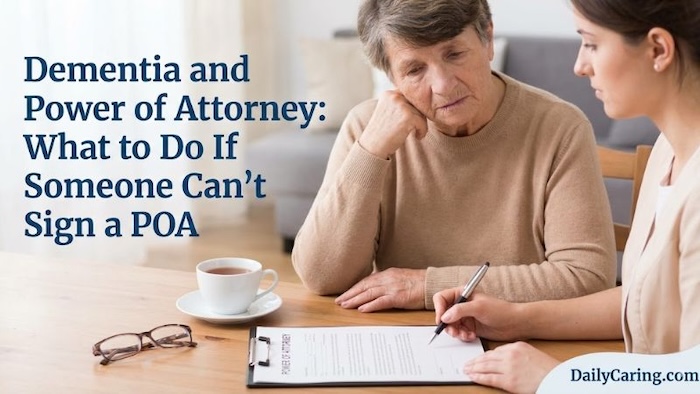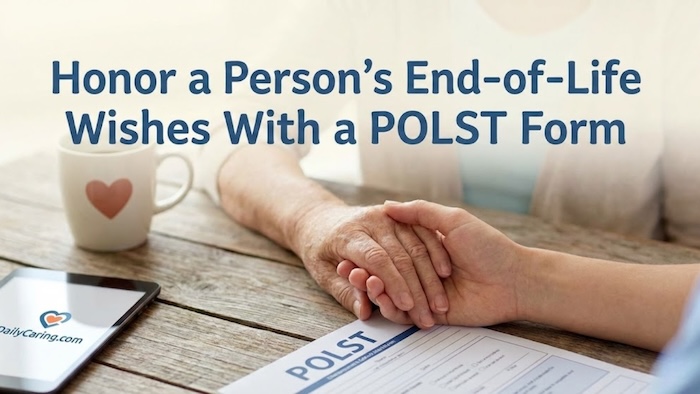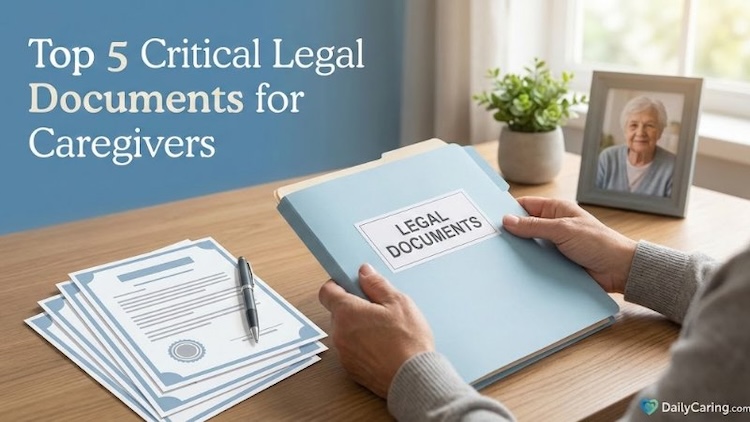When a loved one with dementia delays or refuses to sign a Power of Attorney (POA), families often face a heartbreaking dilemma: how to protect their well-being when legal options seem to vanish. Without a POA, critical decisions about healthcare, finances, and living arrangements can become tangled in court battles when swift action matters most.
This article will explain what to do if your loved one can’t or won’t sign a POA, including emergency alternatives, state-specific safeguards, and steps to navigate the system with compassion. Please don’t wait until it’s too late. Learn how to secure their future while honoring their dignity.

The number of Americans with different forms of dementia, such as Alzheimer’s disease, continues to grow at an alarming rate, according to the Alzheimer’s Association.
If you’re caring for someone with dementia, you may face a dilemma you hadn’t anticipated: They won't sign a power of attorney.
What is a Power of Attorney (POA)?
A power of attorney is a legal document that authorizes another person to make critical medical and financial decisions on your behalf when you are unable to.
Dementia and power of attorney issues can cause unwanted complications in a person’s care. Their inability or refusal to sign essential legal documents may leave the family with limited options that may not be in the person’s best interests.
Ron Anderson, an ARAG® network attorney, says, “There are common scenarios that we see in our practice regarding the impact of dementia on making important decisions and estate planning.”
Here are three common scenarios involving someone with dementia and a power of attorney, the available options, and steps to avoid costly problems.
When is it Too Late for a Person with Dementia to Sign a Power of Attorney?
Often, by the time a caregiver realizes that an older adult has diminished mental capacity, they’re no longer able to sign the necessary legal documents.
Anderson says, “If a person gets to the point where they don’t know who their family members are, what assets they own, and who they would want to make decisions for them regarding their assets and health care matters, then they aren’t mentally competent to sign a legal document such as a health care power of attorney or financial power of attorney.
“In this case,” Anderson advises, “there is very little that can be done for the person except applying to the court for a formal conservatorship or guardianship.”
A conservatorship is when the court appoints a person (the conservator) to control a person’s (or ward’s) finances. A guardianship is when a court appoints a person (the guardian) to have control over another person's care, comfort, and maintenance.
Unfortunately, legal proceedings for these types of conservatorships and guardianships are usually time-consuming and expensive due to legal fees, agents’ fees, and court costs.
Option: Use married status to keep access to co-owned assets
Anderson points out one solution that could prevent these problems.
“If the person is married and, as a couple, they made earlier decisions to hold their assets as co-owners, then the mentally competent spouse can still access the family checking accounts, savings accounts, or other assets without going to court for a conservatorship.”
What if a Person with Dementia is Competent, but Fails or Refuses to Sign a Power of Attorney?
In this scenario, the person with dementia is still able to make sound decisions but has not done any estate planning or has refused to set up any powers of attorney or co-owned financial accounts.
“At this point,” says Anderson, “the person is still entitled to make decisions on their own regarding finances and health care.
“They could sign financial and health care powers of attorney to designate a trusted person to make these decisions. Or, they could choose to make no estate planning decisions at all.”
This can create a challenging situation for everyone involved.
Option 1: Suggest standby conservatorship and/or guardianship instead
One option is to have an open, honest discussion with the person. Emphasize the importance of having a financial or health care power of attorney and the negative consequences of not having one.
If the person still refuses to sign a power of attorney, you could suggest that they consider signing standby conservatorship and/or guardianship papers instead.
These documents would allow them to choose who would make financial or healthcare decisions on their behalf. Later, they would allow the court to hold a voluntary proceeding.
Doing this would be simpler, easier, and cheaper than requiring involuntary guardianship or conservatorship.
“Unfortunately,” adds Anderson, “if the person takes no action, there is very little that we can do except apply to the court for an involuntary conservatorship or guardianship if the person is making decisions that are harmful to themselves.”
Anderson notes that one of his biggest challenges is that people wait too long to obtain these documents because they don’t think they need them. Or, they put off choosing someone to make decisions on their behalf and don’t complete the documents.
Option 2: Emphasize that it’s not about age or dementia
“This can even be the case for a young person,” says Anderson. “For example, a young person may be in an automobile accident in which they incur a head injury and then suffer from temporary or permanent mental incapacity.”
Sharing an example may help your older adult recognize that everyone should have these essential legal documents. They aren’t needed just because someone has dementia or is aging.
What if a Person with Dementia Has the Necessary Powers of Attorney in Place?
This is the best-case scenario – when a person completes the necessary powers of attorney before dementia becomes an issue, or when their doctor can certify that they’re still mentally competent.
Anderson says there are multiple benefits when planning is done, “First, the person can make informed decisions about who they want to appoint as their agent to make health care or financial decisions for them if they cannot do so.
“Second, the person can assist in creating proper powers of attorney documents and decide whether the powers should be effective immediately or upon their incapacity.
“Additionally, any documents may be amended or revised as long as the person is mentally competent.
“Taking these measures often eliminates the need for a court-supervised conservatorship or a guardianship in the future.”
Proactively Complete Essential Legal Documents to Avoid Costly Problems
Mentally competent persons of at least 18 years of age should have a will, financial power of attorney, and health care power of attorney in place.
It’s also a good idea to consider completing a living will.
“This is vitally important to save family finances and ease the burden on those who have to undertake these duties for the disabled or deceased person,” says Anderson.
“A few simple legal documents can save enormous time, trouble, and expense. The worst thing most people can do is to do nothing.”
Visit ARAGlegal.com to learn how to connect with affordable, local network attorneys and have 100% of attorney fees paid in full for legal matters like estate planning.
Limitations and exclusions apply. Insurance products are underwritten by ARAG Insurance Company of Des Moines, Iowa, GuideOne® Mutual Insurance Company of West Des Moines, Iowa, or GuideOne Specialty Mutual Insurance Company of West Des Moines, Iowa. ARAG Services, LLC provides service products. This material is for illustrative purposes only and is not a contract. For terms, benefits, or exclusions, call 800-758-2860.
ARAG® sponsors this article. For more information, see How We Make Money.














My sister’s daughter in law had her sign a medical power of attorney. I am her only living sibling. I was not informed that my sister had signed this. She now has dementia and the daughter in law has casually informed me that she has this power now and my sister has no memory of signing it.
Very difficult situation Harriet. You may want to seek out legal advice if you can. I’m so sorry you’re going through this.
I have been my sister’s guardian/conservator for over 31 years. She has been in a memory care center for 2 1/2 years. Her money is almost gone. I’m trying to get her on Medicaid which means her assets must be below $2,000. The problem is: she has a life insurance policy with the cast value of [redacted]. The company says I cannot cash in the policy and put it toward her care without a Court Order. Is this correct?
We’re not qualified or licensed legal or financial professionals so we’re not able to answer this question. We do have an article about free or low cost legal services that might help – 7 Sources of Free Legal Services for Seniors at https://dailycaring.com/7-sources-of-free-legal-services-for-seniors/
I am a nurse in a dementia word. There is a patient in assisted living that needs to b moved to memory care but he does not have a POA so they will not move him. He hallucinates and is not able to do anything for himself. How would a facility assist in setting up a POA or conservatorship for someone that does not have anyone to help him. He has a seniors citizens representative payee but nothing else.
It’s wonderful that you’re looking for ways to help your patient. This sounds like a complex question since there are likely at least a few legal regulations to navigate. The first step would be to determine who’s able to take action in this situation. Perhaps the administration team in your assisted living community could provide advice or share how the community has handled similar situations.
Help, I was given power of Attorney for my aunt who never had kids. However it is medical. Now she has dementia. I’m now paying her bills,she can’t remember them. What would be my next move? She and I went to a lawyer many years ago the paper said if she could no longer Speak for herself, I would make her medical decision. So what can I do legally. I know what she said to do but its not in writing. I was told who to give her belonging to also.
It would be best to contact an attorney to find out what your rights and options are in this situation.
These articles may be helpful:
– 5 Smart Tips for Hiring an Elder Law Attorney https://dailycaring.com/how-to-find-an-elder-law-attorney-you-can-trust/
– 7 Sources of Free Legal Services for Seniors https://dailycaring.com/7-sources-of-free-legal-services-for-seniors/
My US Coast Guard veteran father is currently hospitalized at James A. Haley VA Hospital in Tampa Florida on Bruce B. Downs Blvd, with dementia, not full blown/not real bad. He still knows I’m his daughter, recognizes my voice on the phone, recognizes me when he’d see me before his hospitalization, and he has requested me to get power of attorney over him so that I can have access to his money more so than I do now so i am able to support and care for myself and our dog- I’m currently using his pension to pay our rent for our apartment, and our bills, and necessities, but, since the hospital is looking to place him in assisted living which means his pension goes with him for his care, that will leave me with nothing. I have no job having lost the one I had recently in September, and it has been VERY difficult for me to get a job. I have tried seeking other attorneys, but all have told me the same thing- nothing can be done because one of my father’s social workers said he cannot sign paperwork due to his dementia, making it sound like it’s worse than it really is- see my statement above about him still recognizing me. The other social worker agreed. I have tried telling the last lawyer I tried they are making it seem worse than it is, but still nothing at all. If I can’t get this power of attormey in some way shape or form, and affordably at that, I am facing becoming homeless as I won’t be able to pay rent or bills if and when he goes to assisted living.
We’re so sorry about this situation. Unfortunately, this is a legal matter so lawyers are the experts who would be able to provide advice.
In case it’s helpful, we found a good list of programs that provide financial assistance – https://www.gofundme.com/c/blog/emergency-financial-assistance
I live in a bad neighborhood. I live in a gated community, but as soon as you step out the gate it is chaos. Drugs, guns, prostitution and extreme mental health problems. They are roaming the streets free as birds, but my Mother who has a Power if Attorney is locked up in a facility that she doesn’t want to be at. Why is it that someone who is [redacted] crazy can walk around free and my Mother can’t? Is it because these people can’t afford to fork out $5,000 a month and my Mother is worth 1 .7 million? I asked a nurse in staff and she got really nervous, changed the subject and then had to end the call. If my brother dies have POA can’t he take her out if there? Just because a doctor said she is incompetent there is no law that states we have to out her in a home. My brother says there is nothing he can do, but I am calling [redacted]. She is considered a Protected Person. It states in her Bill if Rights that she has say so in where she wants to live and who cares for her.
We’re so sorry to hear about this situation. It sounds like you’d need advice from an attorney to figure out how to resolve these issues.
Here are some legal resources that may be able to help – 7 Sources of Free Legal Services for Seniors https://dailycaring.com/7-sources-of-free-legal-services-for-seniors/
Your local Area Agency on Aging may be able to connect you to other local organizations who can provide help. More info here – Local Community Resources for Seniors and Caregivers: Area Agency on Aging https://dailycaring.com/local-community-resources-for-seniors-and-caregivers-area-agency-on-aging/
Need help with getting power of attorney for my mother, she was treating like a piece of trash from hospice. I am the only surviving member of my family left, I had a power of a attorney paper on my computer but it blew out & I need help. My dad & mother made sure there children were well taking care of. Now I am getting forced out of my home, because of a judge and lawyer that has no time for me. I cannot say a word about anything this is not justice, I am sick of there rules they cannot do right. My mom & dad knew I have a terminal illness for 14 years with no cure, just live in hell on earth. Please help me with this matter, even the bank said all I need is a photo ID & power of attorney papers & a bill to show who I am. My problem is I cannot get out at times, I was cursed with this nightmare of a illness. Please help me before they kick me out & die on the streets, my mother said this was my money & I will fight it until I get what is mine. Please help me I will pay you for your help .
We’re so sorry to hear about this situation. It sounds like you’d need advice from an attorney to figure out how to resolve these issues.
Here are some legal resources that may be able to help – 7 Sources of Free Legal Services for Seniors https://dailycaring.com/7-sources-of-free-legal-services-for-seniors/
Your local Area Agency on Aging may be able to connect you to other local organizations who can provide help. More info here – Local Community Resources for Seniors and Caregivers: Area Agency on Aging https://dailycaring.com/local-community-resources-for-seniors-and-caregivers-area-agency-on-aging/
How to handle a situation where POA has been put in place before hand and now the elder person has declined in mental state and conflates a lie and devolves the POA. What is a care giver to do in a situation like this
The best thing to do would be to contact an elder law attorney to understand the legal situation.
These articles may be helpful:
– 5 Smart Tips for Hiring an Elder Law Attorney https://dailycaring.com/how-to-find-an-elder-law-attorney-you-can-trust/
– 7 Sources of Free Legal Services for Seniors https://dailycaring.com/7-sources-of-free-legal-services-for-seniors/